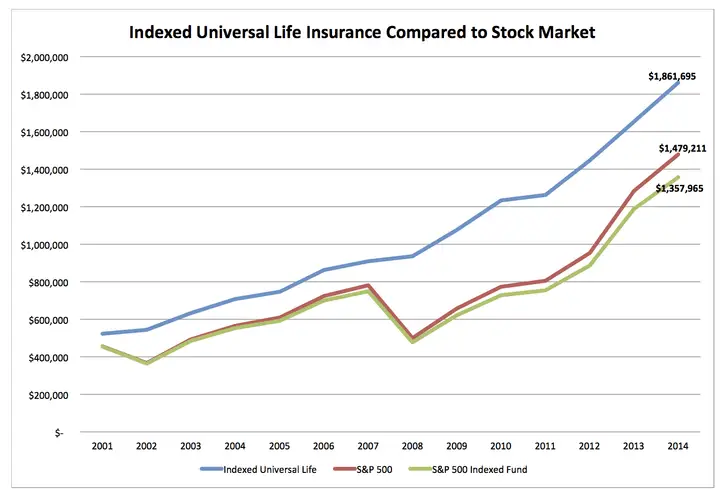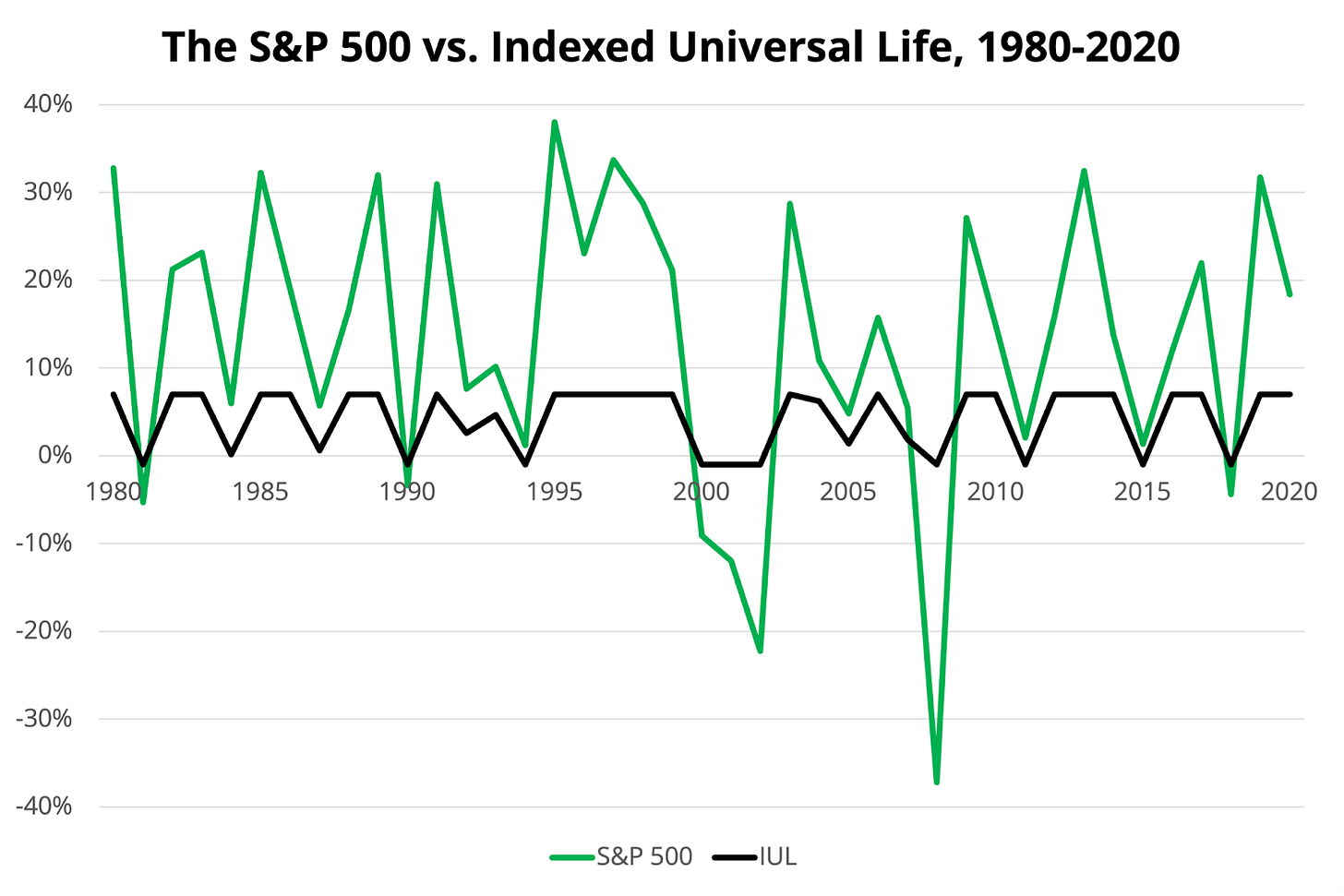All Categories
Featured
Table of Contents
Do they contrast the IUL to something like the Lead Total Stock Market Fund Admiral Shares with no load, a cost proportion (EMERGENCY ROOM) of 5 basis factors, a turn over ratio of 4.3%, and an outstanding tax-efficient record of circulations? No, they contrast it to some horrible actively taken care of fund with an 8% load, a 2% ER, an 80% turnover ratio, and a horrible record of temporary resources gain circulations.
Shared funds commonly make annual taxable distributions to fund proprietors, also when the value of their fund has actually dropped in worth. Shared funds not only call for income reporting (and the resulting annual tax) when the common fund is going up in worth, but can also enforce income taxes in a year when the fund has actually dropped in value.
You can tax-manage the fund, collecting losses and gains in order to reduce taxed circulations to the capitalists, yet that isn't in some way going to alter the reported return of the fund. The ownership of common funds might require the common fund proprietor to pay approximated tax obligations (universal life insurance broker).

IULs are simple to place to ensure that, at the proprietor's death, the recipient is not subject to either revenue or inheritance tax. The very same tax obligation reduction strategies do not function nearly also with common funds. There are countless, frequently expensive, tax catches linked with the timed purchasing and selling of shared fund shares, traps that do not use to indexed life insurance policy.
Chances aren't really high that you're mosting likely to go through the AMT due to your common fund distributions if you aren't without them. The remainder of this one is half-truths at ideal. For instance, while it holds true that there is no earnings tax obligation due to your successors when they inherit the proceeds of your IUL plan, it is additionally real that there is no income tax obligation due to your successors when they acquire a common fund in a taxed account from you.
Universal Life Quotes
There are much better ways to stay clear of estate tax concerns than acquiring investments with reduced returns. Mutual funds may trigger revenue tax of Social Security advantages.
:max_bytes(150000):strip_icc()/Pros-and-cons-indexed-universal-life-insurance_final-1b83c0fd52154eb69edd47f99ab8927a.png)
The growth within the IUL is tax-deferred and might be taken as free of tax earnings via lendings. The policy owner (vs. the common fund manager) is in control of his or her reportable income, hence allowing them to decrease or also remove the tax of their Social Safety and security benefits. This one is fantastic.
Right here's an additional marginal problem. It's true if you buy a mutual fund for say $10 per share simply before the circulation date, and it disperses a $0.50 circulation, you are then mosting likely to owe taxes (possibly 7-10 cents per share) although that you have not yet had any gains.
But ultimately, it's really regarding the after-tax return, not just how much you pay in tax obligations. You are mosting likely to pay even more in tax obligations by utilizing a taxable account than if you purchase life insurance. You're likewise most likely going to have even more cash after paying those taxes. The record-keeping needs for possessing mutual funds are substantially a lot more complex.
With an IUL, one's records are kept by the insurance business, duplicates of annual declarations are sent by mail to the owner, and circulations (if any) are amounted to and reported at year end. This one is also type of silly. Naturally you ought to maintain your tax obligation documents in instance of an audit.
Universal Insurance Logo
Barely a factor to purchase life insurance coverage. Shared funds are generally part of a decedent's probated estate.
On top of that, they go through the delays and expenses of probate. The proceeds of the IUL policy, on the various other hand, is constantly a non-probate distribution that passes beyond probate straight to one's named beneficiaries, and is therefore not subject to one's posthumous financial institutions, undesirable public disclosure, or similar delays and expenses.
We covered this under # 7, however just to evaluate, if you have a taxable common fund account, you need to place it in a revocable count on (or perhaps simpler, utilize the Transfer on Death classification) in order to prevent probate. Medicaid incompetency and life time income. An IUL can give their owners with a stream of income for their entire life time, despite how much time they live.

This is valuable when organizing one's events, and transforming possessions to income before a retirement home arrest. Common funds can not be transformed in a comparable manner, and are often thought about countable Medicaid possessions. This is one more dumb one supporting that inadequate people (you understand, the ones that need Medicaid, a government program for the inadequate, to spend for their nursing home) need to utilize IUL rather of mutual funds.
Iul With Living Benefits
And life insurance policy looks horrible when contrasted rather versus a pension. Second, people that have cash to buy IUL above and past their retired life accounts are going to have to be horrible at taking care of cash in order to ever before get Medicaid to spend for their assisted living home expenses.
Persistent and terminal illness rider. All plans will allow a proprietor's simple access to cash from their policy, frequently waiving any abandonment penalties when such individuals experience a serious illness, need at-home treatment, or end up being confined to an assisted living facility. Shared funds do not offer a comparable waiver when contingent deferred sales charges still put on a shared fund account whose proprietor requires to offer some shares to money the prices of such a stay.
Term Life Insurance Vs Universal
Yet you get to pay more for that benefit (biker) with an insurance coverage. What a large amount! Indexed universal life insurance supplies death advantages to the beneficiaries of the IUL proprietors, and neither the owner nor the recipient can ever shed cash as a result of a down market. Common funds supply no such assurances or survivor benefit of any kind.
I certainly do not need one after I get to monetary independence. Do I want one? On standard, a buyer of life insurance policy pays for the true cost of the life insurance advantage, plus the expenses of the plan, plus the profits of the insurance firm.
Iul Online
I'm not totally certain why Mr. Morais tossed in the whole "you can't shed money" once again below as it was covered quite well in # 1. He simply wished to repeat the very best selling factor for these things I intend. Once again, you don't shed small dollars, but you can lose genuine dollars, along with face serious possibility price as a result of reduced returns.

An indexed universal life insurance policy plan proprietor may trade their policy for an entirely various plan without activating income tax obligations. A shared fund owner can not move funds from one common fund company to an additional without selling his shares at the previous (hence causing a taxed occasion), and redeeming new shares at the last, typically subject to sales charges at both.
While it is real that you can trade one insurance coverage for another, the factor that people do this is that the first one is such a horrible plan that also after purchasing a new one and undergoing the early, negative return years, you'll still come out in advance. If they were marketed the right policy the very first time, they should not have any wish to ever before trade it and experience the very early, negative return years once again.
Table of Contents
Latest Posts
指数 型 保险
Universal Life Insurance Cons
Universal Life Target Premium
More
Latest Posts
指数 型 保险
Universal Life Insurance Cons
Universal Life Target Premium